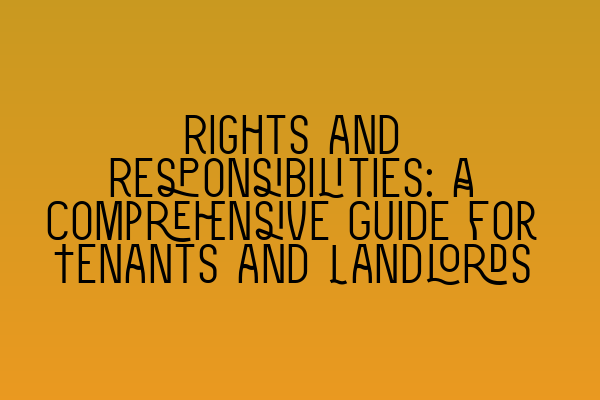Rights and Responsibilities: A Comprehensive Guide for Tenants and Landlords
Are you a tenant or a landlord? Whether you’re renting a property or providing one for rent, it’s important to understand your rights and responsibilities. This comprehensive guide will walk you through the key aspects of the tenant-landlord relationship, helping you navigate the legal landscape with confidence.
1. The Tenancy Agreement: The Foundation of the Relationship
The tenancy agreement is a legally binding document that outlines the rights and responsibilities of both the tenant and the landlord. It’s essential to read and understand this agreement before signing it. If you have any questions or concerns, consult a solicitor to ensure that the terms are fair and in compliance with current legislation.
2. Rights and Responsibilities of Tenants
As a tenant, you have certain rights that protect you from unfair treatment and ensure your well-being. These include:
– The right to a safe and habitable property: Your landlord is responsible for maintaining the property in a safe and livable condition.
– The right to privacy: Your landlord should not enter the premises without proper notice, except in emergencies.
– The right to request repairs: If there are any issues with the property that affect your safety or well-being, it is your responsibility to inform the landlord and request repairs.
– The right to a reasonable rent increase: Your landlord can increase the rent, but it must be reasonable and in line with market rates.
To learn more about tenant rights, check out this article: SQE 1 Practice Exam Questions.
3. Rights and Responsibilities of Landlords
Landlords also have specific rights and responsibilities that they must uphold. These include:
– The right to receive rent payments: As a landlord, you have the right to collect rent from your tenants in a timely manner.
– The responsibility to maintain the property: It is your duty to keep the property in good repair and ensure that it meets health and safety standards.
– The responsibility to protect the tenant’s deposit: If you require a deposit, it must be protected under a government-approved deposit protection scheme.
– The responsibility to adhere to eviction procedures: If you wish to evict a tenant, you must follow the proper legal procedures outlined by the law.
For more information on landlord responsibilities, refer to this comprehensive guide: SQE 1 Practice Mocks FLK1 FLK2.
4. Disputes and Resolving Issues
Despite the best intentions, disputes between tenants and landlords can sometimes arise. It’s important to address these issues promptly and resolve them amicably. Here are some steps you can take:
– Communication: Open and transparent communication is key. Discuss the issue with the other party and try to find a mutually satisfactory solution.
– Mediation: If direct communication fails, consider using a professional mediator to help facilitate the resolution process.
– Legal Advice: If all else fails, seek legal advice from a qualified solicitor who specializes in property law. They can guide you through the legal process and help protect your rights.
To find out more about resolving disputes in the landlord-tenant relationship, take a look at this article: SQE 2 Preparation Courses.
5. Additional Resources and Support
Navigating the complex world of tenant and landlord rights and responsibilities can be challenging. To further enhance your knowledge, consider the following resources:
– Tenancy Rights Organizations: There are many organizations that provide free information and support to tenants and landlords. These organizations can provide valuable advice and assistance in understanding your rights and responsibilities.
– Legal Clinics: Check if there are any legal clinics in your area that offer free or low-cost consultations for tenant and landlord issues.
– Specialized Courses: If you want to delve deeper into property law, consider enrolling in a specialized course, such as those offered by SQE Property Law & Land Law. They provide comprehensive preparation for the SRA SQE exams, helping you become a competent professional in the field.
For more information on available courses and exam dates, visit: SQE 1 Preparation Courses and SRA SQE Exam Dates.
In conclusion, understanding your rights and responsibilities as a tenant or landlord is essential to maintain a harmonious and legally compliant relationship. By familiarizing yourself with the key aspects outlined in this guide and seeking professional advice when needed, you can ensure a smooth and successful tenancy experience.
